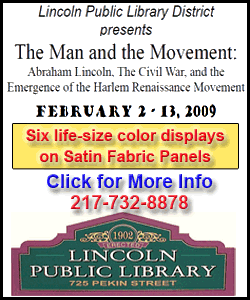 To the editor: To the editor:I am pleased to announce the addition of a major,
30-page chapter titled "Lincoln at 100 at Lincoln" to my
award-winning community history Web site of Lincoln, Ill. This
particular Lincoln Centennial celebration is especially interesting
to compare to those of the present Lincoln Bicentennial
celebrations.
Late last fall, Mr. Richard Sumrall and Ms. Joyce Sutz of the
Lincoln Public Library helped me obtain printouts from microfilm of
several Lincoln newspaper articles describing that city's
celebration of the 100th anniversary of Mr. Lincoln's birth. Using
that information, I researched the planners, honorees, other special
guests and speakers at this local celebration. The new chapter
discusses those people and that event, providing insight into the
social structure and culture of this small Midwestern town in the
early 20th century.
The celebration in Lincoln was held in the Broadway Theatre,
later named the Grand Theatre, on Feb. 10, 1909 (the Grand Theatre
burned in 1960, and this location was later the site of Gossett's
Cleaners). This namesake town celebration was among countless
corresponding events throughout the nation and the world. The
celebration in Springfield, Ill., consisted of a large banquet,
which excluded blacks and required women to sit separately in the
balcony. There, the ladies watched the men below as some of them
imbibed too much wine.

No such problem of overindulgence apparently marred (or
enlivened) the first Lincoln namesake town celebration, which
consisted of a program of patriotic music, a recitation of the
Gettysburg Address and speeches. My new chapter includes a photo of
the Broadway Theatre and biographical sketches and photos of several
of the planners, honorees, other special guests and the two
speakers.
The general committee that organized this namesake town
celebration had more than a dozen members, and they came from the
business community and almost all of the major professions:
education, engineering, government, journalism, the law, medicine
and the ministry. Two of the general committee members had been
officers in the Union Army, and they had taken ex-slaves to Lincoln,
Ill., after the war. All general committee members were active in
community service; several were deeply committed to the chautauqua
of Lincoln -- the largest in the state. At least two people involved
in the celebration had known Mr. Lincoln.
The honorees and other special guests included other Civil War
veterans and prominent citizens. The listing of these elite citizens
in the newspapers reveals a social hierarchy in which judges ranked
at the top and were followed by clergymen, distinguished educators
and leading businessmen, respectively. No women were on the general
committee or among the named special guests, but the most prominent
female civic leader, Mrs. John A. Lutz -- probably the most highly
educated woman in town -- was allowed on the decorations committee.
My new chapter has a biographical sketch and photos of her. The
chairman of the general committee and master of ceremonies was Judge
Lawrence B. Stringer, who gave a short speech about Abraham Lincoln
before introducing the main speaker,
Euclid B. Rogers, D.D.
(Click on names for pictures.)
[to top of second column in this letter]

 |
 The Lincoln Daily Courier said Stringer's speech told a story
that was "new in this city and of more than ordinary interest. That
is one of the reasons why Mr. Stringer's short talk was unusually
enjoyable." Stringer's speech featured a detail about the naming of
Lincoln, Ill., in 1853 that the townspeople in 1909 apparently had
not heard. Stringer said that the town's founders offered to name it
for Mr. Lincoln if he could obtain an advantageous town charter.
According to the newspaper, Stringer said that Mr. Lincoln took this
job and "secured the charter as the promoters wanted it."
The "reward for charter" theme of Stringer's 1909 speech has
mostly been forgotten, and Stringer's "History of Logan County,
Illinois, 1911," does not say that the town's founders were
rewarding their attorney for that particular success only. Rather,
the book explains the town was named by the founders in gratitude
for the collective legal services which Mr. Lincoln provided in
helping to establish the town. Stringer's book also says that the
founders sought to compliment Mr. Lincoln in general for his fame in
central Illinois as a popular personality, well-known lawyer and
public servant. Stringer emphasizes that Mr. Lincoln did not gain
national fame until later (in fact, not till the Lincoln-Douglas
debates of 1858).
Euclid B. Rogers, the main speaker, was pastor of the Central
Baptist Church of Springfield, Ill. He was well-known throughout the
Midwest for his lively oratory in the pulpit and on the stages of
the chautauqua circuit.
Years earlier, Rogers, while a pastor in Pennsylvania, had been
accused of sexual impropriety and mental cruelty to his wife. That
controversy had divided the congregation of a church in Burlington,
Iowa, where Rogers had become the pastor, and these matters were
notorious enough to be reported in the New York Times. Despite these
problems, Rogers was a pastor in Springfield for many years, where
he was an outspoken social critic following the 1908 race riots.
Rogers, noted for his speeches about Abraham Lincoln, was known in
Lincoln prior to his Lincoln Centennial address because he had
spoken at the chautauqua there.

No copy of Rogers's speech in Lincoln has been found, but I did
obtain a short speech Rogers gave on Abraham Lincoln in Springfield
in 1922. My new chapter includes the full text of that speech as
well as analysis of Rogers' celebrated rhetoric. I have sent bound
copies of this chapter to the Lincoln Public Library, the Lincoln
Heritage Museum at Lincoln College, the Logan County Genealogical
and Historical Society, and Main Street Lincoln.
Access a link to a PDF of "Lincoln at 100 at Lincoln" at
http://www.geocities.com/
findinglincolnillinois/
abes200th-lincolnil.html#lincolnfest1909.
Sincerely,
Darold Leigh Henson, Ph.D.
Professor emeritus of English
Missouri State University, Springfield
dlhenson@missouristate.edu
http://english.missouristate.edu/faculty/henson.htm
Honorary member, the Abraham Lincoln Bicentennial Commission of
Lincoln, Illinois
Note: "Lincoln at 100 at Lincoln" reads the same forward and
backward, and that peculiar phrasing is called a palindrome.
[Posted
February 12, 2009]
Click here to send a note to the editor
about this letter. |